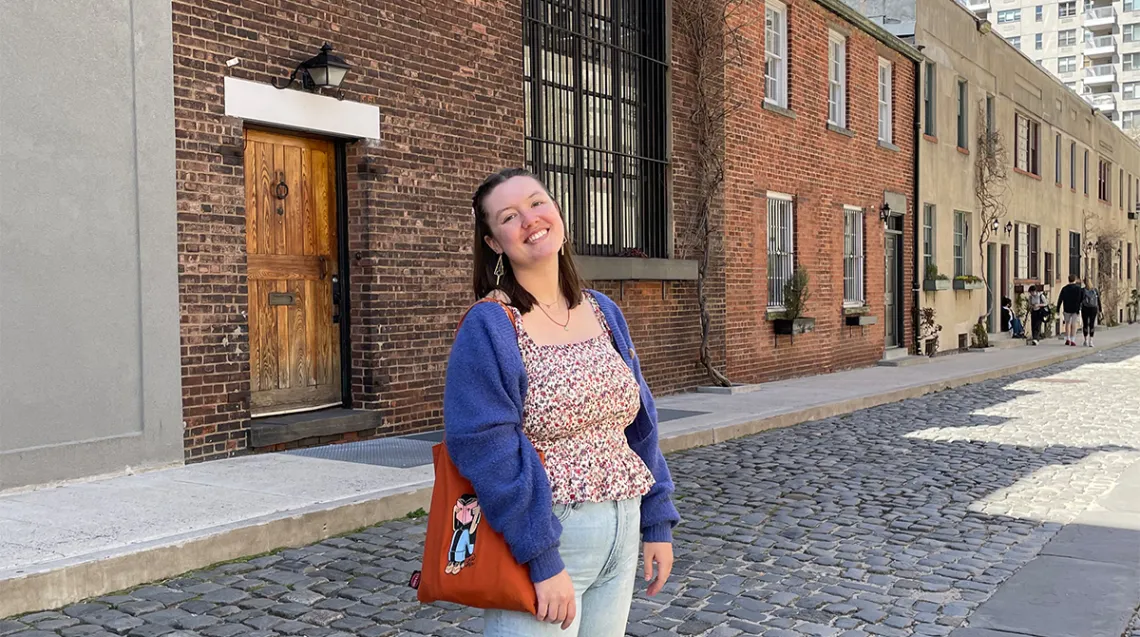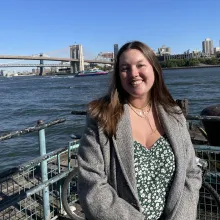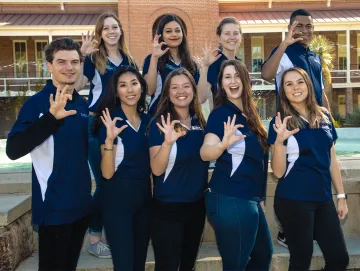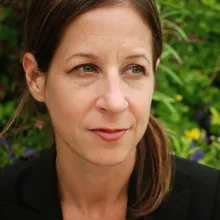Q&A with Alumna Nataly Gruender: From Creative Writing Major to Published Author

Nataly Gruender
In 2020, amidst the pandemic, Nataly Gruender graduated with a double major in English and Creative Writing in the Department of English and a minor in Classics. During her time as a student, she also served as an SBS Ambassador, representing and promoting the college. Presently, Nataly is employed as a Financials Associate at Dystel, Goderich & Bourret LLC. She is also set to release her debut novel Medusa in summer 2024. This exciting publication will mark her entry into the world of literature, showcasing her creative talent and storytelling prowess.
What was your career path after graduation? What do you do at Dystel, Goderich & Bourret?
Before I graduated college, I had been accepted into the Columbia Publishing Program, a five-week summer course, in New York that was meant to fast-track me into the publishing industry. However, I graduated in the height of the pandemic, and so I deferred the Columbia course for a year and began working from home as a grant writer, writing for a company that assisted Native American tribes in Arizona by developing materials for them to apply for federal grants for infrastructure and business projects within their communities.

Nataly Gruender
Once I attended the Columbia course, online, I packed up and moved to New York with a plan to find a job in publishing as soon as I got there. Of course, the publishing industry is notoriously difficult to break into, even with my Columbia certificate, so my first job in New York was as a bookseller in a Barnes & Noble in Brooklyn. At the same time, I began working part-time as a data-entry assistant for the Howard Morhaim Literary Agency. While that role only last a few months as I helped them transfer their backlog of contracts into an online system, that experience was actually what got my foot in the door at Dystel, Goderich & Bourret. The system I had learned at the Morhaim Agency was the same system that DG&B used, and they hired me on as a financials assistant.
At DG&B, my main role is processing advances and royalty payments for our authors. The agency has a dozen operating agents that each have a long list of clients, and I deal directly with every payment that comes in from domestic and foreign publishers. The day to day at my job can vary depending on whether we're in a high royalty season, as royalties are usually paid out twice a year by publishers, but the agents are making new deals year-round so there are always new projects. I've often been asked how I ended up with a numbers job after getting my English and creative writing degrees, but luckily the Excel spreadsheets do most of the calculating for me! The fact that my job is more data-driven means that I get to keep all my creative energy for my writing projects.
Can you tell me about your debut book Medusa? What inspired you to write this book?
The book titled MEDUSA actually started as my senior thesis for the English Honors Program at the UofA! My advisor Kate Bernheimer was a big supporter ever since I began this project. My initial inspiration for this book was to write out Medusa's whole story, because we only ever see bits and pieces of her life in the classical Greek myths, and I thought that she deserved to have her whole story told and that she needed to be the one to tell it. We know Medusa as the snake-haired monster who was beheaded, but I wanted to see who she was as a girl, and then as a woman before she was transformed, and I especially wanted to know what she thought of her power. Did she resent it? Did she love it? Medusa has become such a symbol of monstrous femininity, and yet there hasn't been an account of her life told from her own perspective. It was my goal to create a narrative that got the reader into Medusa's head and let us think about what it means to be a monster.
How did your degrees in creative writing and English help prepare you for your work in a literary agency and as a novelist?

College of Social and Behavioral Sciences Ambassadors
My courses for my creative writing degree helped me immensely as I developed my writing style and helped me dig into the kinds of stories I wanted to read. The workshops I participated in developed my ability to review queries for my coworkers and look at works objectively, even if the style or topic is different from what I am usually drawn to. While my current job features more numbers and analytics than I could have anticipated when I applied to be an English major, the critical thinking and problem-solving skills I worked on in the humanities-focused courses have helped me tackle challenges unique to the publishing industry.
Looking back on your college experience, what were the most rewarding parts?

Kate Bernheimer
The most valuable takeaways from my college experience are the relationships I built. Even though we've scattered across the country, the group of friends I made while at the U of A have supported me all through my writing journey. I've loved being able to cheer on their successes in return.
I also need to give another shout-out to my brilliant honors thesis advisor, Kate Bernheimer, who was the first person to see Medusa's story and has been her number one cheerleader ever since. Even after I graduated, Kate has been a constant supporter and I've been so happy to grow my writing career with her.
What advice do you have for current or prospective students?
I hope that current or prospective students take every chance to explore what they’re interested in, and not be afraid to try something new. My minor in classics started a fun excuse for me to take Greek mythology courses, but it prepared me to write MEDUSA. I definitely came into undergrad thinking that I needed to have everything figured out so that I could follow a straight line from freshman year to my first job, but that line is also full of twists and turns and ups and downs, and during all those bumps you might discover a brand new path that you would have never found otherwise. Take the opportunity to explore all the options, but please, learn how to write a comprehensive email and put those humanities critical thinking skills to work. With these abilities, you can do anything.

